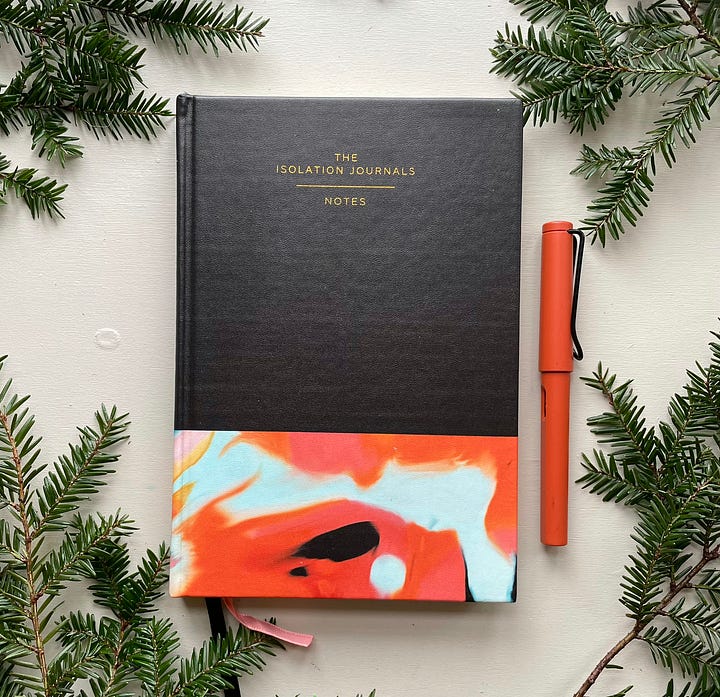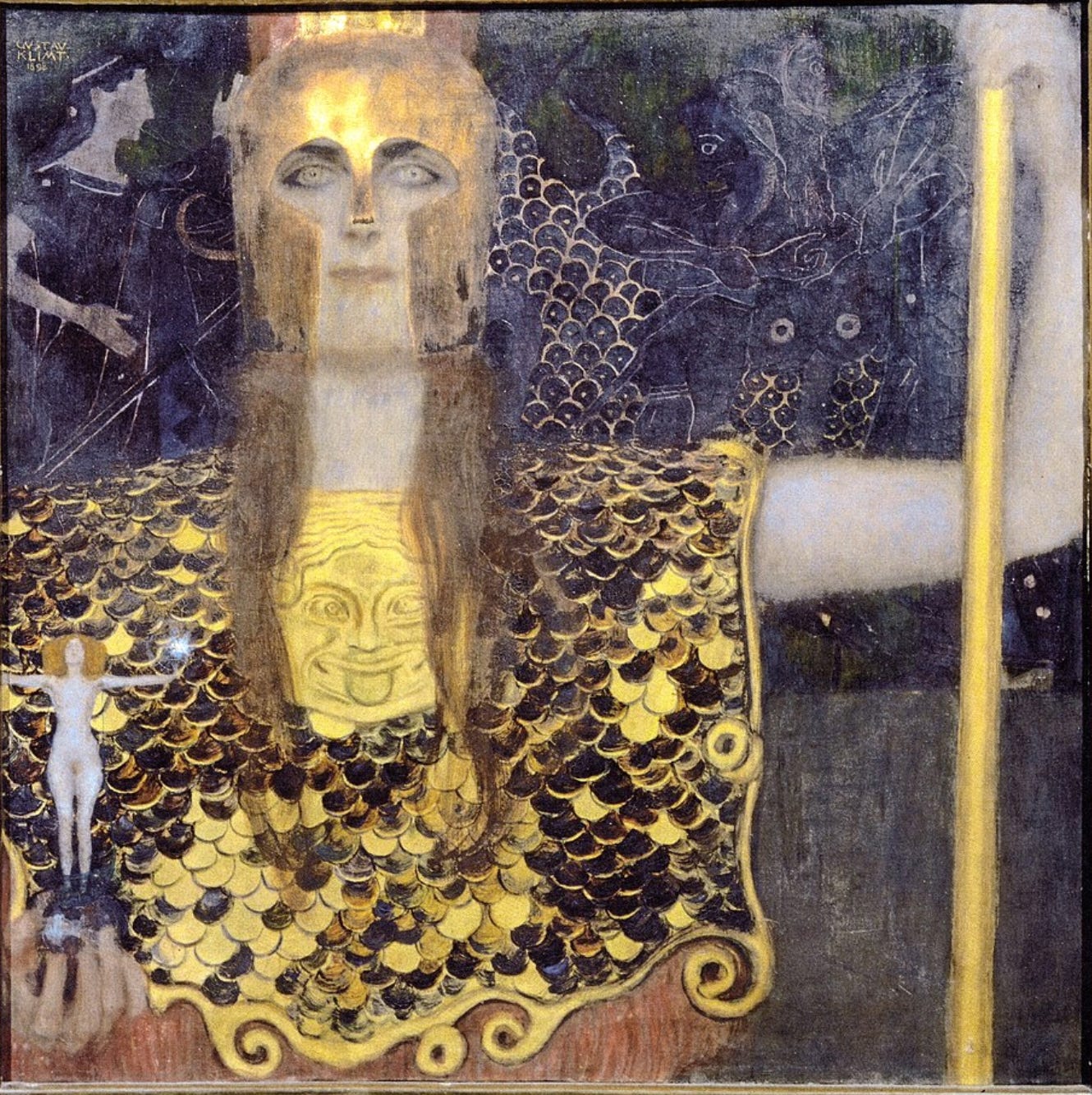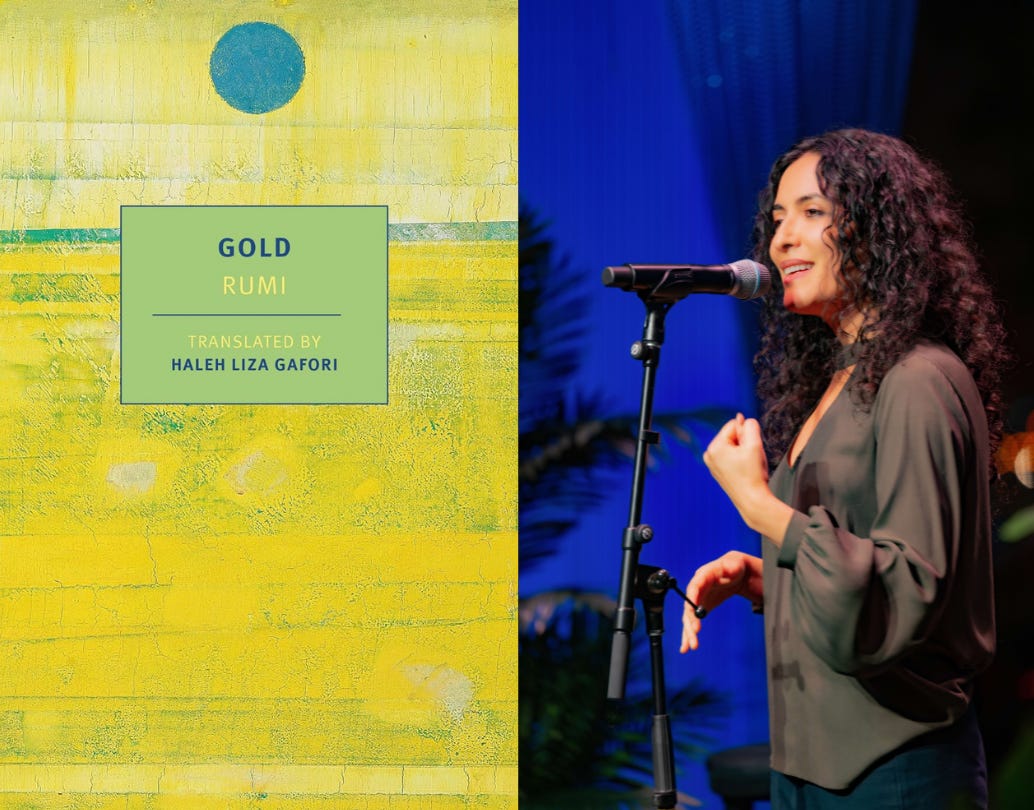Prompt 274. Migration, Hibernation, & Drowning Practice
& the mystic poet Rumi on laughter and dying
Hi friend,
I’ve been home at my little farmhouse in rural New Jersey this week, and a few days ago, I woke up to the chattering of hundreds of birds. I looked out the window and saw that an enormous flock had alighted in the leafless trees on my fence line—a little pit stop, mid-migration—and immediately I experienced a flash of recognition. For the past few months, I’ve been on the road pretty much nonstop, sharing our documentary. It’s been so joyous, but it’s also worn me a little ragged. After being away, it feels so good to get back into my routine.
Creative work often emerges in seasons, and currently I’m entering my favorite: diving into the private world of writing a book. I’m also preparing for my first painting exhibit this summer—a series of large-scale watercolors inspired by the fever dreams I painted while in the hospital. I’m feeling a slight sense of terror at what lies ahead, about all the unknowns of the creative process. At the same time, I’m excited to get quiet, to cocoon, to experience whatever that unfolding will be.
So maybe more than a bird on a pit stop, I feel like a bear, preparing to tuck in for winter. Slowly, incrementally, I’ve been going to bed earlier and earlier, and waking up earlier, hours before the sun rises. I start the day with coffee and a new journal by the wood stove. I didn’t spend much time journaling this fall, to be honest. On the first few work trips, I packed books and journals, but I never cracked the spines so eventually I stopped toting them around. Now I’m feeling a strong pull to return to it; I’m feeling the need for it. To make way for the new, I need to clear the noise and refill the well of inspiration.
So I’ve been giving myself a luxurious hour each morning on the page. I’m letting things unspool as they will, which means my journal is more of a hybrid than normal. In some moments, I’m processing the past, others I’m making notes for a collection of essays I’m working on called Drowning Practice. Other times, I’m using it as a commonplace book. (If you’re not familiar with this concept, it’s a collection of quotes, ideas, and observations that you find interesting or inspiring.) I’ve been reading voraciously—all essay collections, studying form, twisting my mind out of whatever it is I believe an essay to be—and I’m encountering so many powerful insights and poetic lines that I’m committing to the page.
Like the very first paragraph from Barbara Kingsolver’s collection Small Wonder: “It is possible to move away from a vast, unbearable pain by delving into it deeper and deeper—by ‘diving into the wreck,’ to borrow the perfect words from Adrienne Rich.” (I wonder, did Kingsolver copy that into a commonplace book?) She goes on to say that studying the terrible thing allows you to see its constituent parts, to name them, and to realize that some of them can be healed or at least transformed. In doing this, the terror eventually dissipates. She concludes, “I suppose what I am describing is the process of grief.”
This resonates—it is what the grieving process feels like for me. But it also seems like an apt description of the creative process, and I’ve always found that creating is a way to wrestle back power. I’ve shared this line before, but the poet Louise Glück encapsulates this so beautifully that I’ll share it again: “Writing is a kind of revenge against circumstance. Bad luck, loss, pain—if you make something out of it, then you’ve no longer been bested by these events.” What I love about this is the sense of defiance, that refusal to be subsumed by the terrible thing, which given that we are mere mortals is inevitable.
It’s the seemingly unique position of being human that we live knowing we are going to die—and throughout history, voices have emerged to show us how to carry on with this knowledge. One is the thirteenth-century Sufi mystic Rumi, whose seeking wonder still guides us, whose searching wisdom I’m excited to share with you today. It’s a poem called “Your Laughter Turns the World to Paradise,” from a gorgeous new volume called Gold, translated by the brilliant poet and performer Haleh Liza Gafori (who also happens to be a member of this beloved community!). To stoke a fire of defiance in your own belly, read on.
Sending love,
Suleika
Our Isolation Journal No. 1 and Surrender Tote—
The New Year is only two weeks away, and we’re currently making plans for our annual New Year’s daily journaling challenge (more next week!). With that in mind, I wanted to remind you that our custom Isolation Journal No. 1 is still available, and if you order it this week, it should arrive in time to kick off 2024!
We also still have a few Surrender totes available. A few days ago, we got this note from a community member: “I am a certified tote bag addict so feel qualified to say this: yours is the most beautiful tote bag I’ve ever seen! I did not expect to receive something so gorgeous. I treasure it already but certainly will not be tucking it away for safekeeping. I’ll be using it as often and as much as possible!” We’re so proud of how the tote turned out and excited to hear that people are loving it as much as we do!


Other Items of Note—
We’re meeting at the Hatch, our virtual creative hour for paid subscribers, today—that’s December 17, from 1-2 pm ET. This month’s meeting will be hosted by Carmen, and she’ll leading a guided creative meditation—one that was inspired by an Isolation Journals community member! Find everything you need to join us here.
Each Friday, we share a small joy in our Isolation Journals chat. We call it our chorus of collective gratitude. It’s so simple—for example, this week I wrote about a thermos—but utterly buoying. If you’d like a little lift, click here!
Prompt 274. Your Laughter Turns the World to Paradise by Rumi
Translated and read by Haleh Liza Gafori
Your laughter turns the world to paradise. It tears through me like fire. It teaches me. Reborn in emptiness, I emerge laughing, here to learn from Love new depths of laughter. I’ve been short on courage, but I have a heart of sunlight, straight from the king’s hand. I stir up laughter even in those who fear joy. Crack open my shell. Steal the pearl. I'll still be laughing. It’s the rookies who laugh only when they win. Last night, the spirit of dawn came to my room and gave me a lesson in laughter. Our blazing roars lit the morning sky. When I brood like a rain cloud, laughter flashes through me. It’s the habit of lightning to laugh through a storm. Look at the furnace. Look at the stones. See the glowing red veins? Gold-laughing in fire, daring you, “Prove you’re no fake! Laugh even when you lose.” We’re fodder for death so learn to laugh from the angel of death. He laughs at the jeweled belts and crowns of kings— all that splendor’s just on loan. Treetop blossoms erupt in laughter. Petals rain down. Laugh like the bud of a flower, Hugging the ground. Its hidden smile opens to a laugh that lasts a lifetime.
Your prompt for the week:
As Rumi says, “It’s the habit of lightning to laugh through a storm.” Write about a time you laughed in defiance of circumstance.
If you’d like, you can post your response to today’s prompt in the comments section, in our Facebook group, or on Instagram by tagging @theisolationjournals. As a reminder, we love seeing your work inspired by the Isolation Journals, but to preserve this as a community space, we request no promotion of outside projects.
Today’s Contributors—
Rumi, Molana, Jalāl ad-Dīn Mohammad Balkhy (1207–1273), was born in or near the city of Balkh, in present-day Afghanistan. Considered the greatest poet of the Persian language, Rumi’s major works are the Masnavi, a six-volume collection of mystical teachings in rhyming couplets, and the Divan-e Shams-e Tabrizi, a collection of lyric poetry dedicated to his spiritual mentor. He died and was buried in Konya.
Haleh Liza Gafori is a translator, poet, vocalist, and performance artist of Persian descent born in New York City. Her book entitled Gold featuring translations of poems by the 13th century sage and mystic Rumi was published by New York Review Books in 2022. She is a 2024 MacDowell fellow and has received a grant from the New York State Council of the Arts. Her own work has been published by Columbia University Press, Literary Hub, Brooklyn Rail, and elsewhere. She performs and lectures at universities and venues across the country.
For more paid subscriber benefits, see—
On Anti-Blessings, a video replay of my Studio Visit with the brilliant and hilarious Kate Bowler, where we talked about avoiding aggressive futurism, right-sizing our fears, and seeking joy in the midst of hard things
The Logic of Dreams, where we discussed instructive dreams, read Haleh Liza Gafori’s translation of Rumi, and practiced listening to the creative urge
To Betray or Not to Betray, an installment of my advice column Dear Susu in where I answer a community member’s question—which is the memoirist’s forever question—“How do I write my story without hurting the people I love?












When my daughter was practicing for her drivers’ permit, one of her brothers, home from college, asked to use my car to take her for a lesson in backing up. As they left the house, I said, “ be careful”. ( “ Careful” will find its’ way into this account, but not as I had intended). I prepared dinner, lit candles and if memory is correct, it was spring and the windows were open. A beautiful evening. An hour later, my son walked through the kitchen door, somber and serious. “ You should come outside, Mom”. I followed him to the back of my car, my little blue VW Fox. My pretty little, perfect, car. Opening the trunk, my shaken daughter beside me, my brave son revealed my tail pipe, very “carefully” wrapped in a blanket. Backing up into a large boulder was not the intended lesson. It was the sight of that broken muffler, loving wrapped as if a present, missing only a ribbon, that sent laughter through my body. The contrasts were delicious.,” Time for dinner”, I said, joyful my children were home safe. We ate, shared wine, stories and laughter. Years later, my son wrote in a Mother’s Day card that he took a valuable lesson from that event. Life happens. We have a choice how we will respond.
I’m grateful for the wisdom granted me thot evening and the good fruit it bore, years later. It was given to me from the heart of all love.
I’m grateful, too, for your message here, Suleika. For the past year and a half I’ve been nursing losses that have felt insurmountable. Losses that have turned my world around. Losses that I know want to instruct me. Until now, I was not ready to face whatever truths may, oh, most surely do, lay hidden in the pain. Like that broken muffler, there is a lesson. There is a gift. Waiting. In this quiet season, I, too, am waking early and gathering strength for the journey. As I do, I remember this line attributed to St. Theresa of Avila, “ God writes straight with crooked lines”. I am a crooked line.
A blessed Sunday to all of you. Love, Jacqueline
My mother...she has advanced dementia now, but before, she was a giver of wisdom and I am just now beginning to run it all through my soul. She would say, in the face of my difficulties, "Laugh, and rise above it." I received a rejection from a small publishing house, with the words, "We do not accept writing of such low stature." Ouch-super sting. And then, I laughed and thought, "Fucking idiot. Taking your existential hate for life out on me." I continue to write.